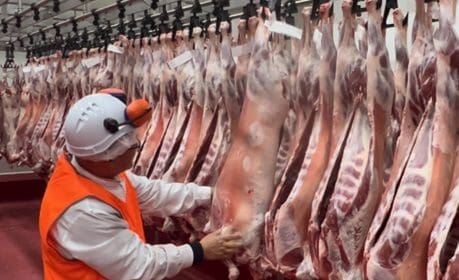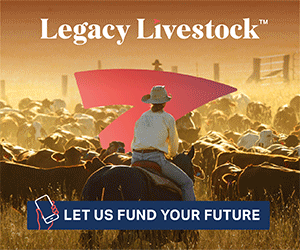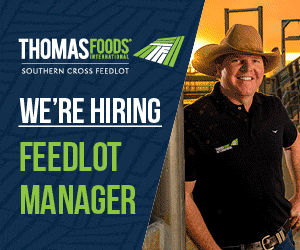Western Australia’s Shark Lake abattoir near Esperance has closed its doors, barely 14 months after the troubled plant re-opened under new ownership.
Shark Lake was bought by South American meat processor Minerva in 2021, in a deal that also included the Great Eastern abattoir near Tammin. The Shark Lake plant re-opened in July last year, with a capacity to process 9000 lambs a week, mostly for export to the Middle East
 Minerva said at the time it had plans to expand the capacity and efficiency of both its WA facilities. It said the combined final sheep slaughter capacity in the state could be as high as one million head of lamb and mutton a year.
Minerva said at the time it had plans to expand the capacity and efficiency of both its WA facilities. It said the combined final sheep slaughter capacity in the state could be as high as one million head of lamb and mutton a year.
Like all Australian meat processing facilities, Shark Lake had struggled to attract staff, recruiting some overseas employees out of Fiji, Papua New Guinea, Brazil and New Zealand.
Beef Central sought a response from Minerva Foods Australia about last week’s plant closure. We received the following this afternoon, attributed to Australian chief executive Iain Mars:
“Minerva Foods Australia has been operating an abattoir and boning room in Esperance for just over a year, during which time there has been extensive renewal of the existing facility alongside development of operational, procurement and sales capability.
At this time, MFA has taken the decision to undertake a review of operations at Esperance to fully analyse what further investment is needed. Whilst this review is being conducted, the Esperance site will not be operating.
Where possible staff will be redeployed to other facilities in the MFA group with a small number taking up redundancies.
All existing meat orders will be fulfilled by MFA through its operations in Tammin and Victoria.”
Operations at Shark Lake have been spasmodic, closing in 2017 before being bought and re-opened by Rami Koyu’s Central Agri Group a year later. Shark Lake closed again during 2020, due to COVID, before being bought the following year by Minerva. At one point earlier in its history, the plant processed around 25,000 cattle and 500,000 small stock annually.
Local livestock contacts in the Esperance area said the Shark Lake plant had earlier last month scheduled a short routine maintenance closure, but that was extended, leading up to last week’s indefinite shut-down.
The company had not provided clear signals about what was happening, one contact said.
“It’s closed for the immediate future, we’ve been told, but it’s unclear what their long term plans are,” he said. “Reading between the lines, their numbers possibly weren’t adding up. They were still operating under capacity, for one reason or another.”
The contact said there had not been any indication of a longer closure until last week.
Another local contact said he had sheep booked for slaughter this week at Shark Lake, but he had not been contacted by the company at all, and had only learned of the closure through his agent.
“There’s been zero contact from Minerva itself,” he said.
“People had hung-on to old season lambs, in the expectation of a re-opening after the scheduled maintenance break – and suddenly it’s not re-opening. People have been stuck with old season lambs that they now have to find homes for, elsewhere,” he said.
“The timing is not ideal. We’re coming into our spring flush of lambs, and the closure has taken 3000 or 4000 lambs (processing capacity) out of the system. The drop in competition, can only add weight to the deterioration in livestock prices,” he said.
Old season Merino lambs that this time last year were worth 750-800c/kg in the WA market are worth 400c/kg this year, and new season lambs 460-470c, he said.
“We’re at 60pc of where we were, price-wise, last year.”
Extra shifts at V&V Walsh Bunbury
Meanwhile, another large WA livestock processor, V&V Walsh, has announced a move to a six six-day working week and increasing its lamb to sheep ratio to help clear a surge of WA lambs coming onto the market.
Whether the move is coincidental, or directly in response to the Shark Lake abattoir closure is difficult to tell, but it clearly takes time to gather a workforce to expand production in this way. Another large WA sheepmeat processor, WAMMCo, has apparently also added a Saturday shift to its schedule.
V&V Walsh’s Bunbury-based beef, sheep, and lamb plant has been working to its regular five days a week schedule and concentrating on the more profitable mutton trade.
After discussions with its livestock suppliers seeking to free-up pastures with new seasons lambs, the company has scheduled an extra day processing and a greater focus on lamb.
The change, which will be in place for three weeks of every month until Christmas, will ensure an additional 5000 lambs a week are processed, the company said.
 “The move will mean that V&V Walsh’s weekly lamb requirements will increase by 30 percent to 21,000 lambs a week,” V&V Walsh chief executive Brent Dancer said.
“The move will mean that V&V Walsh’s weekly lamb requirements will increase by 30 percent to 21,000 lambs a week,” V&V Walsh chief executive Brent Dancer said.
“We understand that there are more numbers of old WA lambs on-farm than normal for this time of the year, so we hope this move will free-up pastures for producers to get weight into their new-season lambs.”
Dr Dancer said there were two related factors for the build-up of old-season lambs.
“Firstly, post COVID overseas cold stores in major consumer markets are full of high-priced lamb that they are struggling to shift. And secondly, the resultant fall in price prompted many farmers to hang on to their lambs in the hope the market would rebound, which hasn’t happened,” he said.
“We think this is a relatively short-term supply-demand imbalance, and will soon correct, however, there was a need from our lamb suppliers to shift large numbers of old season lambs now, and so we have responded.”
Despite the price fall, WA lamb prices were currently higher than Eastern States prices, and cattle prices had slid for largely the same reason.
“It is a very crowded export market at the moment,” Mr Dancer said. “However, we have discussed this with our customers, and they have agreed to take extra lambs to help us get through the current backlog.”

